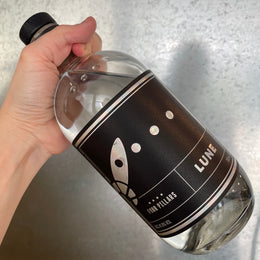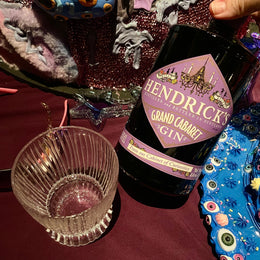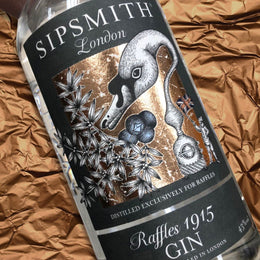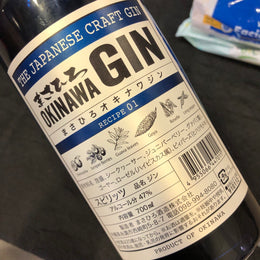
It's early into the year 2020, and across Japan, hospitals and clinics are dealing with a sudden shortage of alcohol-based sanitisers as the Coronavirus pandemic sweeps the nation.
In the city of Ninohe in the Iwate Prefecture, fifth-generation owner of Nanbu Bijin Sake Brewery, Kosuke Kuji observed that there was over 200 children with complex medical needs in his prefecture that now lacked crucial alcohol sanitiser needed for their daily care. It was then and there that Kuji decided to marshall the resources of his brewery to start producing high-proof alcohol for use as sanitisers.
From Sake... to Alcohol Sanitizers... to GIn?

Kosuke Kuji, the fifth-generation owner of Nanbu Bijin Sake Brewery, decided to start producing high proof spirits to combat a shortage of alcohol sanitizers during the pandemic. (Image source: Nanbu Bijin)
True to his word, Kuji and his team started producing bottles of high proof alcohol, which were then dispensed to families of those children with chronic medical conditions to be used for sanitising their medical equipment. As the pandemic progress during 2020, they gradually increased their production of these alcohol sanitizers, and during this process, eventually obtained a license to start distilling spirits.


Brewery workers packing Nanbu Bijin's 65% high-proof alcohol bottles, which were used as medical-grade sanitisers during the pandemic. (Image source: Nanbu Bijin)
It should be noted that prior to 2020, the Nanbu Bijin Sake Brewery had already been around and producing sake for over 120 years. Yet, due to the pandemic, sales of sake had taken a 15% hit, leaving the brewery with quite a bit of excess rice supply. Thankfully, with a distilling license now secured, Kuji realised he could use the excess rice supply to make his own distilled spirits, including gin and vodka! Not only would this help offset some of the slump in sales, but it would also be a sustainable way to help local rice producers in his prefecture.

The newly produced Nanbu Bijin Gin would be made from a base spirit of Ginotme rice. (Image source: Nanbu Bijin)
And so, he set out to create Nanbu Bijin Gin, using a base spirit made from a native rice species called Ginotome.
A Tale of (Only!) Two Botanicals: Juniper and Urushi Bark
What might fascinate most to know about Nanbu Bijin Gin is that this gin uses only two botanicals in total. The first being juniper, as is required by law for a spirit to be considered a gin, and the second beingJoboji urushi. The choice to use two botanicals is a highly intentional "less is more" approach, and reflects Kuji's aim to spotlight the specific botanical of urushi bark.

A urushi-gaki collecting sap from the urushi tree. (Image source: Japanese National Tourism Organisation)
For those wondering, urushi is a tree that's natively found in Kuji's hometown of Ninohe. The sap of the urushi tree, which are collected by highly skilled urushi-gaki (or tappers), has been used as a prized lacquer since the Edo Period to coat sacred ceremonial ornaments, artistic masterpieces, and utilitarian objects.
By using only Juniper and Joboji urushi to infuse the gin with new flavors, Kuji wanted to create a gin that distinctively showcased the locality of where it was produced. To further accentuate the flavor and add subtle smokiness to the gin, they would scorch the barks, twigs and trunks of the urushi tree prior to distillation.
With a base spirit made from sake rice and only two botanicals meant to do the heavy lifting when it comes to flavouring, the gin is certainly an intriguing one! So without further ado, let's get to tasting!
Nanbu Bijin Gin: Tasting Notes

Colour: Clear
Aroma: Really juniper forward, with a bright citrusy note of fingerlimes, yet at the same time there’s this vanillic tone to it, as well as an earthy smokiness of charred lacquered wood, which comes off alittle bit like roasted coffee beans.
Taste: This really deep woodiness that’s very aromatic and smoky but also very earthy - it’s giving kinako or roasted soybean flour, as well as some roasted coffee bean. The woodiness here is quite a unique flavour that’s at once waxy but also alittle bit evocative of toasted tree bark, which comes through as being quite woody and almost tannic. There’s a gentle vanillic yet earthy sweetness to the body. There’s a really subtle and understated rice pudding richness in the background too. The juniper does give it quite a spicy and peppery kick here.
Finish: It’s clean here, with a long finish. Lingering notes of that very deep earthy smokiness. There’s a little bit of fruitiness here too but it’s really high toned and bright, almost like a sort of diffuser scent, somewhere between a grapefruit and a pomelo.

My Thoughts
This is a really interesting gin - for a gin made of just two botanicals, it’s got alot of complexity and it’s made for itself an incredibly unique flavour profile. It’s got both a very well expressed top note of citrus and wood, with an understated but very rich base of rice pudding that makes for a very exotic expression. It conveys a smoky woodiness that I can say I’ve found in anything else, and at times it feels it’s almost getting into coffee territory.
That said, I will caveat that if you’re getting into this blind, that smoky woodiness might catch you off guard as it can come off rather austere and isn’t exactly the most approachable from the get go - it’s quite dry and almost feels like the essence of wood bark (because it is) in liquid form.
I did nevertheless find this incredibly exciting, and with that I challenged myself to think of what could pair with something like this - it’s giving fowl, or wood smoked hen or pigeon, some sort of poultry; I think it would work well with Ginger Ale or a ginger-based tonic.
Happy sipping!








